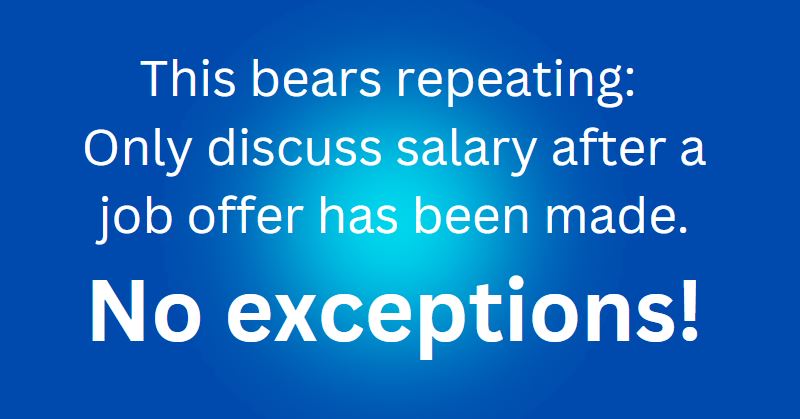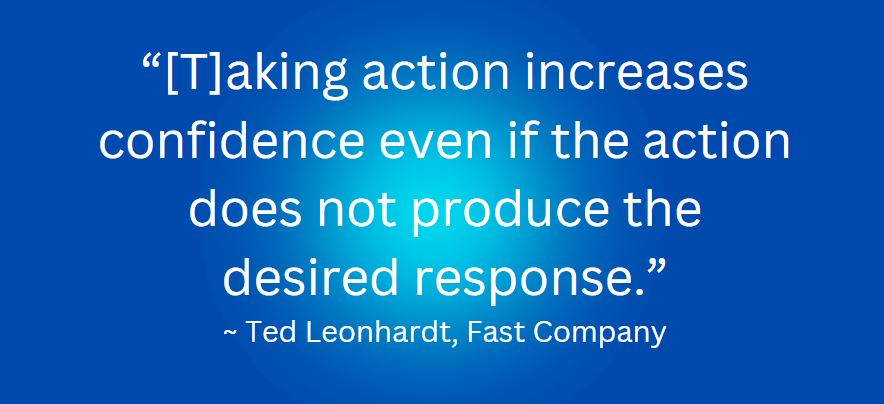Show Me the Money! Four Key Things to Know Before Talking About Salary In a Job Interview
Are you ready to talk about salary in your next interview? Learn how to prepare yourself for salary negotiations–and win!
When it involves salary, US companies are still lagging behind–and dragging their behinds–on pay transparency. And, when it comes to supporting or enforcing it, lawmakers aren’t moving fast enough, either. No matter how important a company’s work culture may be, salary is still a top priority for job seekers. We all need money!
Yet, here we are, still applying to jobs largely in the blind. Depending on the company, a candidate can expect to go through several interviews (and weeks) before learning what a position’s real salary is. Then, when an offer finally arrives, the recruiter wants to play footsies around making a reasonable offer. It’s beyond frustrating.
Forget about trying to explain why companies do this; you can pretty much guess: budgets, greed, economy–it doesn’t matter. When you apply for a job, your only concern should be getting the salary you deserve (plus a little more!) So, how do you do that?
You get what you want by doing some digging around. Being informed is the best way to confidently state what you want and not settle for anything less than you deserve.
Know your market worth
Knowing your market worth is the same as knowing your market value salary. Once you know your market worth, answering salary expectation questions becomes much easier. Knowing exactly what you’re worth, and what salary offer you’ll walk away makes negotiating simpler, too.
So, what exactly is “market value salary?”
“A market value salary is the amount of money that an employee should be paid for their position, based on the current market conditions. This number is usually determined by looking at similar positions within the same industry and geographical location. While doing the salary negotiation, you will want to make sure that you are being paid at or above the market value for your position.” BioSpace.com
It’s almost impossible to know the salary you deserve if you don’t have a clear picture of what you’re worth in the job market. While there are many websites offering market value salary information–and I do suggest looking at as many as possible–they are not to be taken as gospel. There are too many variables left out of the equation when salaries are shown on some of these sites.
Take a few steps back before visiting these sites to first establish your baseline. Determine what salary you need to live comfortably. This cannot be done by guessing, or even just going over your bills–although that’s a starting point. (Note: this is not an article about budgeting. That’s another website.)
Grab a tablet of paper and write
- Your monthly expenses and bills.(Housing, utilities, food, entertainment, health costs, various insurance, vehicle payments, education costs or fees, debt from loans or credit, saving and/or retirement deposits, cleaning and toiletries, childcare, pet care, repairs, phone and internet, subscriptions, and miscellaneous.) Multiply the total of all these by 12. That’s how much it costs you just to exist each year.
- Find the average cost of living in your area.
- Suggested resource: https://www.numbeo.com/cost-of-living/
“Cost of living is a measurement based on the amount of money you need to cover your everyday expenses, such as housing, health care, and food. Understanding cost of living can help you weigh the economic cost of moving to a new city or state.” TheBalanceMoney
- Estimate the value of your years of experience (based on your profession), your education, your skills, your upskilling, and expertise.
- Write down the top accomplishments you’ve made in your current or last position. You might realize that you accomplished things that were above and beyond your previous or current job description. This may qualify you to look for a higher position than you originally intended; or it may allow you to set a higher market value salary for yourself.
- Write down all the duties and expectations that come with a job for which you would be applying. Now start using salary guides to help estimate your market worth, but don’t rely on job titles. Job titles mean different things at different companies. Base your worth on the responsibilities you’ve had and will have.
Keep going
What benefits do you need, and perks do you want? All of these have monetary value. They are also viewed monetarily by employers, and are factored in when estimating a salary offer. While some benefits are legally required by employers, others are optional and used for recruiting and retention. So, first, find out what benefits are your legal right, and eliminate these from your estimate.
For each non-essential benefit you want, add estimated value of each. Perks you’d like that have monetary value: tuition reimbursement, student loan repayment program, gym memberships, daycare, unlimited PTO, extended family leave, remote/flexible work options, employee assistance programs, retirement, and any number of other perks have value and should be considered. Doing this will give you an idea of what an employer looks at when determining salary, which is your next step.
Consider what factors employers are looking at

Employers weigh in numerous factors as they determine a position’s salary. Know what these factors are.
Employers most commonly use a competitive market analysis method when gauging a salary. They look externally at fair-wage laws and market data to figure out what competitors pay. Budgets, the wages of their current employees who are in similar roles, and the value of the non-monetary benefits they provide, like vacation time and flexible hours are also factors they consider.
They consider the unique qualifications of a candidate, assessing the worth of their education and certifications, years of experience, and skills. Employers do a complex pay analysis to determine salary, which is partially explained on HR-Guide.com. But here is a list with some of the factors employers consider when determining salary:
-
- Where your target position is in the pecking order in that particular company.
- How easy your position is to replace
- Your location/cost of living
- The position’s salary compared to others in the same position in the company.
- The number of people a job may supervise
- The supervision required of the person in your position
- How costly an error made in the position would be.
- The confidentiality of data with which you work.
- Benefits and perks
- Industry
- Size of the company
- Your performance and personal attributes.
- Your education and certifications
- Any rare skills critical to the employer’s success
- Complexity of duties
- Mental and physical demands
- Working conditions.
- Cost of employee turnover
- If your current duties could be divided up among other employees for just a small bump in their pay.
- What Salary.com and Payscale.com say (Yes, they use them, too.)
- Time of year
- The company’s financial health
- The health of the industry
You’d be wise to try to figure these numbers out for yourself before an interview to have a clear idea of your market value salary from the employer’s perspective. Beat them to the punch on any of these items on the list, and incorporate them into your market worth, such as rare skills critical to a team or company’s success. Or emphasize the complexity of your duties for a target position.
Know your target company
Companies do not exist in a vacuum. They are affected by the economy, major events, politics, and what other companies are doing. They are also influenced by trends, social media, competitors, and their industry as a whole. Because of this, the way they operate and their health as a company are impacted by these forces. In turn, how they are impacted may play a role in their salary decisions. Therefore, you should be aware of what a company’s current health is.
Here are different health aspects to consider when you research a company you are targeting for employment.
Financial health

To learn about a corporation’s health, such as bankruptcy history and stock information, the Security Exchange Commission (SEC) offers help on their website. According to Investopedia, “The U.S. Securities and Exchange Commission’s Electronic Data Gathering, Analysis and Retrieval (EDGAR) database provides free public access to corporate information including registration statements, prospectuses, and periodic reports filed on Forms 10-K (audited annual financial statements) and 10-Q (unaudited quarterly financial statements).”
Other valuable sources of financial health information on public and private companies are Forbes, Fortune, and Crunchbase. Sometimes the financial information is provided with clear numbers; other times, news and events can indicate a company’s financial well-being.
Industry health

Research your industry as a whole, and not just your individual company. Companies base their salaries in large part on what the market is doing. So, if your target company is doing very well but the industry seems shaky and is laying off, this could affect your salary negotiations.
Reputation health

You can learn about their reputation as a provider from customer reviews on sites like Google, Yelp!, and even their individual social media accounts. Again, reports are not entirely conclusive as people with complaints tend to post more than those who are happy. However, looking at the type of complaints can be telling, especially if they are consistently about the same issue.
Answering salary expectations
Now that you’ve determined your market salary worth, including some important considerations that influence how an employer will estimate your salary, it’s time to pick a few numbers. Pick a salary range, one that has your market worth as the lowest number, and the highest number that is reasonably above the market worth. Also pick what you actually want to offer when it’s time, something higher than the middle of your salary range. Finally, choose a walk-away number–a figure you will absolutely not go lower than if offered, even if it is exactly your market salary worth.
Based on your research, pick some figures
(Details later in article)
- Your market worth [Example: $80,000.]
- A salary range [Example: $85,000-$95,000]
- A start number for negotiations [Example: $89,455.00]
- A walk-away number [Example: $86,000]
But before walking into a first interview, know your rights when it comes to employers asking you salary questions. Laws vary from state to state, and even localities, so know where you stand. For some states, asking about previous salary and/or salary expectations is a violation of the National Labor Relations Act (NLRA).
Incidentally, Here’s a very useful PDF resource on employee rights regarding salaries, including unequal pay, by consulting firm Mercer McLennan. I encourage you to grab it. Laws such as these help to level the playing field.
If asking about salary expectations is legal in your state, and they ask you prior to making an offer of employment, don’t refuse to answer the question. But don’t volunteer a number, either. Simply tell them you’d like to learn more about the specifics of the position before you can be clear on what you would expect.
After you’ve been given a job offer it is acceptable to discuss salary. If they don’t ask about your salary expectations, but instead just tell you what the salary is, then you should ask them a couple of questions. First, ask them if the salary is negotiable. (Even if their offer is good.) Second, ask how they determined the salary for the position. Never just accept a salary because they offer it.
Then, state your salary range, in a manner such as this:
“Based on the market value salary of the role, along with my X years’ of experience, and my education, the salary range I’m looking at is $85,000-$95,000, along with XYZ benefits.”
This is when negotiations will begin.
Know how to negotiate

Salary negotiation does not have to feel intimidating. Knowing your market value means being clear on what you’ll accept.
Negotiating salary is often avoided because it seems scary. Candidates fear they will appear greedy, or only want the job for money. But the goal of negotiating salary is to ensure you receive a fair package so you are happy with a company and it is a place you want to stay . Most employers expect candidates to negotiate salary. In fact, they are ready for it.
Talking to Glassdoor.com Josh Doody advises, “Sometimes it’s easier to avoid uncomfortable parts of a negotiation by deferring those parts of the conversation until after you’re hired. That can be a very expensive mistake because you won’t have the same latitude to negotiate and improve your position once you’re in the door. Push through the discomfort and get the best possible result now,”
Once you know your market value salary and what your needs are (benefits/perks), it is much easier to negotiate because anything too far from the mark will become unacceptable to you. (Remember: you should have a set walk-away number in your head before beginning negotiations.)
Having a clear salary figure ensures you don’t accept the first offer if it is below your decided mark. An employer will always start their offer on the lower end, but that doesn’t mean it’s what they are actually willing to pay.
If a job ad states the position’s salary range is $66,000.00-$90,000.00, for example, and your research shows that your market worth (including cost of living) commands a salary closer to $80,000.00, prepare to ask for something higher. (You can always go down, but never up after you’ve given a low number.)
Once a job offer has been made and you’re asked what salary you have in mind, offer a realistic range. Using your salary market worth of $80K, tell them that based on your research, the salary range you have in mind is $85-95K, with generous benefits. If they offer $82K, you’re slightly above your worth, but don’t accept. The negotiations aren’t over. You can still go higher, and you need to discuss benefits. (Keep in mind you want to do more than just pay your bills, you want money to enjoy life, too!)
After their offer, let them know you need to mull it over for a day or so. Go home, and prepare a counter-offer. If your benefits are already on the table and are acceptable, come back with a precise number, say, $89,455.00. In turn, they may counter your offer with $86K. You can choose to accept their “lower” offer with an additional benefit, such remote working three days a week, or some other perk. You have negotiated and it resulted in a win-win. Then, have everything put in writing.
According to Randstad.com, having a precise number gives you an edge in negotiation power. “Research from Columbia Business School shows that candidates who ask for $54,750 instead of $55,000, for example, are more likely to receive offers closer to that figure. This is because employers think they’ve carried out extensive market research to reach that figure.”
Know where to start, and what to include, such as the benefits package. Do not–DO NOT–wait until after you’re hired to try to negotiate benefits because once you’re hired, the negotiation is over. Trying to get anything after you’re hired makes you just an employee with “the gimmes.” Get everything you want before accepting, and, once again, get it in writing.
Practice makes perfect
There are different methods of negotiating, as explained by Harvard’s Program On Negotiating. The best negotiating style is a competitive-collaborative one. This means as you firmly go after your desired salary, you also explain your worth and the value you will add to that company. At the same time, you might also be willing to accept trade-offs such as remote working in lieu of the higher salary point you requested.
The biggest problem people have with stating or negotiating their desired salary is lack of confidence. Either they’re afraid to offend the employer, they’re worried about looking greedy, or they’re having imposter syndrome (doubting their abilities and qualifications).
One of the best ways to feel comfortable claiming your salary worth is by doing your research. You’ll have “proof” in writing. Say it out loud, repeatedly, until it fits. Practice stating your salary range. Reaffirm your market worth. Practice negotiating. And practice walking away if they don’t see your worth. Don’t budge from what you know you’re worth to be.
Salary Guides
https://www.careercontessa.com/advice/equalpayme-know-your-worth/
https://www.bls.gov/bls/blswage.htm
https://www.monster.com/salary/
https://www.careerbuilder.com/salary
https://www.repvue.com/salaries (For sales jobs)
https://www.omnicalculator.com/finance/salary-to-hourly
https://www.paylab.com/us?lang=en
https://www.jobsearchintelligence.com/etc/job_seeker_salary_calculators.php
https://buffer.com/salary-calculator/senior-community-strategist/intermediate
https://www.levels.fyi/calculator/
https://elpha.com/salary-database (Geared toward women.)
https://www.comparably.com/salaries
https://www.roberthalf.com/salary-guide
https://www.salaryexpert.com/salarycalculator
https://www.atriumstaff.com/salary-guide/
Let’s talk more about it. Join us on Facebook and LinkedIn
Does your resume need help? Check out our resume rewrite packages!
Category: Human Resources, Interviewing, Salary











